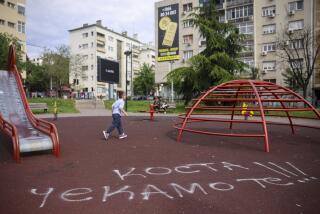Balkan Leaders Apologize for ‘Evils’ Done by Their Nations in War
- Share via
BELGRADE, Serbia-Montenegro — The presidents of Croatia and of Serbia-Montenegro surprised their citizens Wednesday by apologizing to each other for “all the evils” done by their countries in wars and pledged to work to bring reconciliation.
As many as 200,000 people were killed in the ethnic and religious violence of 1991 to 1999 that redrew the map of the former Yugoslavia.
The apology came during the first visit to Belgrade by a Croatian president since the Croats declared themselves independent from Yugoslavia in 1991. It was heralded as a landmark moment and a signal of the gradual warming between the two countries.
Speaking without notes, Svetozar Marovic said, “As president of Serbia-Montenegro, I want to apologize for all the evils any citizen of Serbia and Montenegro has committed against any citizen of Croatia.”
Croatian President Stipe Mesic reciprocated. “In my name I also apologize to all those who have suffered pain or damage at any time from citizens of Croatia who misused or acted against the law,” he said. Mesic arrived Wednesday morning on a special flight from Zagreb to Belgrade; the countries do not have regular air service.
The presidents also pledged to work together to ensure that individuals who committed crimes during the war would be brought to justice.
That was a reference to efforts by both leaders to remind their citizens that guilt for the horrors of the war rested with individuals and not with all Serbs or all Croats. In the volatile Balkans, citizens of both countries have had a tendency to blame all of the citizens of the other for the violence.
Dusan Janjic of the nongovernmental group Forum for Ethnic Relations told Agence France-Presse news service that the statement would help the rapprochement between the two countries.
“Any apology, especially coming from the heads of states, is a welcoming act. If nothing else, it is a symbol of a new culture,” Janjic said.
Many Serbs appeared to view the apologies as a significant symbol but little more. Nationalist feeling still runs high and there is a deep disaffection with politicians, whom many Serbs blame for having led them into war.
Furthermore, a qualifying game for the European soccer championships was being played Wednesday evening in Belgrade -- a face-off between Serbia-Montenegro and Italy -- riveting attention to such a degree that when Belgrade radio and television reporters asked passersby what they thought about the apologies many expressed ignorance of the Croatian president’s visit.
The two presidents are viewed as moderates, largely removed from the nationalists, who still represent a significant segment in each country.
Croatian President Mesic, 69, who was born near Belgrade when both countries were part of Yugoslavia, is viewed as a charismatic politician who recently has become a strong proponent of peace and reconciliation. He made a historic visit to Israel, where he apologized for crimes committed by the Nazi-backed Ustashe regime in World War II concentration camps in Croatia.
However, he began his political life at the other end of the spectrum as one of the founders of Franjo Tudjman’s ultranationalist party, the Croatian Democratic Union, or HDZ, although he split with the late Croatian dictator in 1994.
More recently he is known for his fiery encounter with former Yugoslav President Slobodan Milosevic during Milosevic’s trial by a war crimes tribunal at The Hague, where Mesic was the first head of state to give evidence against the deposed leader.
Marovic, the Serbia-Montenegro president, is a Montenegrin. Under the new loose union of the two states, the president is elected by the joint parliament and has little power. Marovic is seen as an operative, albeit a likable one, of Montenegro’s former president and strongman, Milo Djukanovic.
The efforts to reach out to each other seemed to set the tone for the day of talks, as other politicians involved in the meetings came out making similarly conciliatory comments.
*
Times staff writer Rubin reported from Vienna and special correspondent Cirjakovic from Belgrade.
More to Read
Sign up for Essential California
The most important California stories and recommendations in your inbox every morning.
You may occasionally receive promotional content from the Los Angeles Times.










